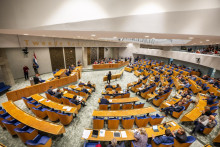Under the current rules, students from the European Economic Area and Switzerland can get Dutch student financing if they work in this country at least 56 hours per month. That is more hours than have been agreed in Europe. After a series of court cases, Education Minister Robbert Dijkgraaf has therefore agreed to alter the policy from 1 September. The requirement will now be 32 hours, in principle.
Comment
The policy adjustment is a direct response to the ruling of the Central Appeals Tribunal in the case of a Portuguese student who was ordered by the Education Executive Agency (DUO) to repay 18 months worth of student financing. She lost an earlier court case concerning the same issue, since she had worked fewer than 56 hours per month.
The Central Appeals Tribunal found that decision to be justified in light of the fact that the student had only worked an average of 12.5 hours per month. However, the Tribunal did comment that the Netherlands is interpreting the rules too strictly. To be eligible for financial support, a student would have to work roughly 32 hours per month instead of 56. Dijkgraaf has therefore decided to adopt this interpretation.
Exceptions
The new requirement will therefore be 32 hours of economic activity per month, although in some cases students may even need to work less. If they can prove that they have worked for more than half a year, 24 hours per month is sufficient. Also, students working less but earning at least 50 percent of the social assistance level can also claim student financial support.
Additional conditions
Earlier this year, the House of Representatives urged Dijkgraaf to impose additional conditions on applications for student financing by European students.
VVD MP Zohair El Yassini was afraid of the potential for a ‘pull factor’. He wants to avoid a situation in which ‘Juan from Madrid comes to study philosophy in the Netherlands’ and receives a grant, while local lad ‘Sjon, who wants to become an electrician or solar panel installer’ misses out. Pieter Omtzigt also drew attention to the importance of addressing this issue.







